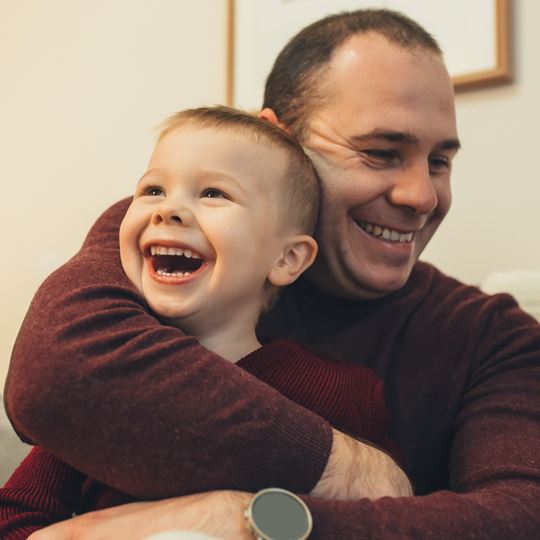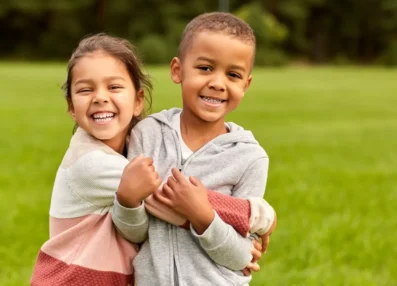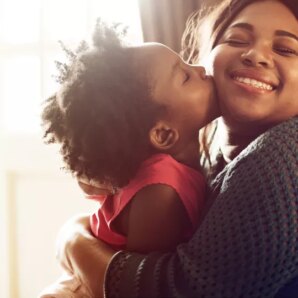The foster care matching process we use at Fosterplus is designed to ensure that children can grow alongside loving foster families who can best suit their unique needs, and with whom they can build lasting bonds.
Read on to learn more about what makes a great match in foster care.
What makes for a good match between a child and a foster parent?
Matching is an in-depth process whereby we select the right foster family for each child in need of a foster home. One study by Ofsted found that high-quality, lasting matches flourish when foster parents and children receive the right support, and when ‘timely information [is] shared based on a detailed understanding and analysis of children’s individual needs and foster carers’ skills and experiences.’
There are several factors we consider when matching a child with their new foster family. These include:
- Location. Wherever possible, it’s important that children are able to maintain their connections with family, school and friends.
- Living with siblings. Research shows that keeping biological siblings together in foster care can have enormous benefits. Wherever it’s in the best interests of the children, we aim to match siblings with a foster family who are able to take them in together.
- Culture, ethnicity and faith. Fostering is a major change for children, and being paired with a family who have an inherent understanding of their identity can help children to settle in better and not lose sight of who they are through the big changes associated with living in foster care.
- Children’s unique health and care needs. If you’re looking to welcome a child with a disability or who has additional needs, such as Autism, ADHD or FASD, we would ensure you have the right knowledge and skills via our wide range of training to support you in caring for children with unique needs.
- Other children. Some children may struggle to live in a home where they need to share the attention of their foster parents, while others might thrive best when there are other children in the home to play with and befriend.
- Personality and preferences. Things including likes, dislikes, hobbies, lifestyle preferences and personality traits all go into making a good match. Many of these things come over time as children and families bond and get to know one another better.
The benefits of child-centred matching
The best matches are achieved when children are treated as the unique, special people they are, and all of their needs and preferences are taken into account. We call this child-centred matching.
At Fosterplus, we strive to…
- Listen to children’s voices. At the heart of our matching process is ensuring that children are fully listened to throughout the process. This includes asking them about their preferences rather than just assuming, recognising that different children will have different priorities which might not match up with what we expect.
- Take children’s needs and preferences on board. While one young person might see being able to stay in regular contact with their siblings as the most important thing when it comes to matching, another might be more concerned with being able to stay at their current school, or being able to live with a family who shares their religious background. We advocate for children’s choices in order to find them the right foster home.
- Share relevant information. We believe that children should be able to learn as much about their new foster family as possible before going to live with them (and vice versa), to provide reassurance and make the transition to their new home and their new life much smoother. This can include sharing pictures and asking our foster families to create a family book.
Forging lifelong family bonds
By considering children’s preferences and being sure to share relevant, up-to-date information with everyone involved in the matching process, we help to ensure that children are able to settle in more easily with their new foster family.
Our robust matching process also means that we experience very few unplanned endings, and many of the children in our foster families remain in long-term foster care or even stay with their families beyond age 18, in a ‘Staying Put’ arrangement.

“Our young person has been with us since he was just 3 years old and he’s 16 now. He’s one of our children; we are his family. My parents are his nanny and grandad, my siblings are his aunts and uncles. I remember the first moment he called me mum, it was a really warm, fuzzy feeling. He just did it constantly from then on. He’s always got us – we’re there for as long as he needs us – and he knows he has got his birth family, too.” – Jodie, foster mum
Learn more about how we create successful matches here at Fosterplus.
Considering your family’s needs during the referrals and matching process
We do everything we can to ensure that a match is built on strong foundations, so that it can benefit everyone in your foster home. Here are a few things which we’ll consider when matching you with a child or young person.
Your children’s needs: Birth children in foster families are an important part of the fostering household. Their needs, preferences and what is in their best interests will always be an important consideration when our referrals team are identifying potential matches for your family.
Your own needs: When considering a match in foster care, it’s important to have a realistic understanding of your own skills, abilities and needs. You must also consider your own limits around time and energy when welcoming children into your home, especially if you are a single foster parent. You’ll never be pressured into accepting a match which you feel isn’t quite right, and your preferences around things like the age of the children you are matched with will also be taken into account.
Family pets: If you have any pets at home, a pet assessment will be conducted during the fostering approval process to ensure that it’s safe for them to be around children. Some children may be frightened or unsure around some animals, so a foster home which contains pets won’t be suitable for every child.
“We found that the matching process is really useful. We’d suggest taking your time reading through your referrals. It’s hard to say no, but you need to make sure that each match is right for you and your family, and you need to make sure that children are matched with the right people.” -Brandon and Adam, foster dads
Are you ready to foster?
As we’ve learned, careful matching is an essential part of building stable futures for care-experienced children. One of the biggest barriers to creating lasting matches is the fall in foster families since the Covid 19 pandemic, meaning there are less foster families available to meet a child’s needs.
If you think you could foster, we encourage you to reach out to our team today. You’ll be in safe hands with Fosterplus, and can always rely on our experienced team for guidance and hands-on support.






